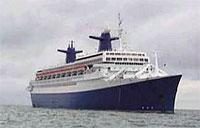BAN: Send ship back!
by Sharidan M. Ali, The Star (Malaysia)
 |
 |
 |
 |
| |
 |
|
| |
The SS Norway has been anchored off Port Klang since Aug 10. (Picture by Sharidan M. Ali) |
|
 |
 |
 |
|
| |
27 February 2006 –
Malaysia should withdraw the permission given to ocean liner SS Norway to anchor off Port Klang because it contains 1,250 tonnes of asbestos-containing material, which could be harmful.
Basel Action Network (BAN), an international toxic trade regulator, which made the call, is urging the local agencies to retract the approval given to the 43-year-old cruise liner, once the longest in the world.
The vessel has been anchored in Pintu Gedung off Port Klang since Aug 10 with its fate unknown.
For months, there’s been talk in the shipping and marine circles that the vessel has been sold to an Asian ship-breaking company.
The Marine Department in Port Klang is keeping a close watch on the ship’s activities since it dropped anchor off Port Klang.
A report by Lloyds List Daily stated that the Bangladesh government had blocked the vessel from being demolished as it feared the ship’s asbestos content would pose a health hazard to workers.
It was reported that the ship experienced main propulsion breakdown and it had to be anchored in Port Klang waters.
BAN coordinator Jim Puckett said Malaysia should immediately call on the port state in Bremerhaven, Germany from where the ship departed, to have the vessel returned and repaired.
“Although Germany has little jurisdiction over the owner of the vessel, it has the most leverage in this case since they allowed the ship to sail and the responsibility according to Basel Convention (BC) lies with the exporting state,” he said.
According to the Greenpeace website, SS Norway under its new name, Blue Lady belongs to Norwegian Cruise Line.
Puckett said Malaysia had the right to return the ship to the port of departure, as the country was a party to the Basel Convention.
“Moreover, Malaysia has ratified the Basel Ban Amendment forbidding the export of toxic waste from rich developed countries to developing countries.
“At the time of export, the owner had claimed that the ship was to be repaired and refurbished and made into a floating hotel,” he said.
He added that it was sad that the owner did not pursue the options to reuse and refurbish the vessel.
“It is a unique treasure and efforts should be made to turn Norway into a floating hotel or some other related purpose similar to the Queen Mary in Long Beach, California.
“However, this reuse destination in our view does not absolve Germany from being the responsible exporting state.
“We believe that the Basel Convention does apply to this export.
“Unless Germany had received consent from Malaysia to export the ship to the country for disposal, storage pending disposal or repair.
“The ship is in fact illegal traffic under Article 9 of the Basel Convention,” he said, adding that Greenpeace had warned the German government on the matter.
Puckett said Germany should have been more careful in allowing the ship to sail as any repair operation could have cleaned out asbestos, polychlorinated biphenyls (PCBs) or any other hazardous substances.
“While it has not been proven that asbestos can impose any danger to marine environment, floating asbestos could end up on beaches to negatively affect nearby populations,” he said.
Meanwhile, Greenpeace toxic campaigner Martin Besieux said Malaysia’s right as a transit country should be respected.
“The owner must inform the relevant authority about the end life of the ship.
“In the case of Egypt for example, the authority agreed with Greenpeace that aircraft carrier, Clemenceau had to be considered waste under international rules and that Egypt as a transit country had to be valued.
“If the owner refuses to do so, Malaysia could apply international and national law or agreed guidelines on the matter,” he said.
Alternatively, Greenpeace is currently working on the global standardisation of ship breaking guidelines.
“The objective is to join forces in view of the upcoming UN negotiations for a new convention on ship breaking on March 20 in London.
FAIR USE NOTICE. This document contains copyrighted material whose use has not been specifically authorized by the copyright owner. The Basel Action Network is making this article available in our efforts to advance understanding of ecological sustainability and environmental justice issues. We believe that this constitutes a 'fair use' of the copyrighted material as provided for in section 107 of the US Copyright Law. If you wish to use this copyrighted material for purposes of your own that go beyond 'fair use', you must obtain permission from the copyright owner.
More News
|